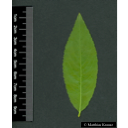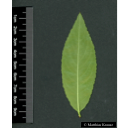Useful information about the taxon (species, subspecies, variety...)
Salix alba L. 1753
Salicaceae
(APG IV)white willow
Akzessionnummer: VG-10169
Pflanzjahr: 2023
Patenschaftstext: Dr. Walter Hess, Stuttgart
Taxon concept: The Plant List (2014), version 1.1
Distribution: Europe without Scandinavia; Turkey, Caucasus, Iran, Western Siberia, Middle Asia, Western Himalayan Mountains, Northwestern Africa; introduced to Scandinavia
Salix alba L. - Accepted: Salix alba L. bei The Plant List (2010); Familie: Salicaceae (APG III)Salix alba L. - Accepted: Salix alba L. bei Zander 2008; Familie: Salicaceae (Zander 2008)Salix alba L. - Accepted: Salix alba L. bei Schmeil-Fitschen 2019; Familie: Salicaceae (APG IV)Salix alba L. - Accepted: Salix alba L. bei BfN Checklist Flora DE; Familie: Salicaceae (APG IV)Salix alba L. - Accepted: Salix alba L. bei World Flora Online - APG IV (Angiosperms); Familie: Salicaceae (World Flora Online - APG IV (Angiosperms))
- Life form
- woody, tree
- Natural occurrence (habitat)
- margins of lakes and rivers
- Constraints according moisture
- not tolerant of waterlogging
Bundesamt für Naturschutz (BfN) (1999-2001 and ongoing): Floraweb - Daten und Informationen zu Wildpflanzen und zur Vegetation Deutschlands. www.floraweb.de.; Erhardt, W., Götz, E., Bödeker, N. & Seybold, S. (2008): Der große Zander. Enzyklopädie der Pflanzennamen. Band 2. Arten und Sorten. Eugen Ulmer KG, Stuttgart (Hohenheim), 18. Aufl., 2103 S.; Haider, M. et al. (2005): Wildbienenkataster. See: https://www.wildbienen-kataster.de; Kämper, Wiebke et al. (2018): Flower visitation honeybee and bumblebee. See: https://www.bexis.uni-jena.de/ddm/data/Showdata/16086?version=2; Ministerium für Ernährung, Landwirtschaft, Umwelt und Forsten, Baden-Württemberg (Hrsg.) (1985): Pflanzenkatalog zur Verbesserung der Bienenweide und des Artenreichtums (Kurztitel: Bienenweidekatalog); Oberdorfer, E. (2001): Pflanzensoziologische Exkursionsflora. Für Deutschland und angrenzende Gebiete. Eugen Ulmer Verlag, Stuttgart, 8., stark überarb. u. erg. Aufl, 1056 S. 978-3-8001-3131-0.; Plants for a Future (1996-2012): PFAF. See: https://pfaf.org/; Pritsch, Günter et al. (1985): Bienenweide.. Neumann-Neudamm, Melsungen; Pritsch, Günter et al. (2007): 200 Trachtpflanzen erkennen und bewerten.. Kosmos, Stuttgart; Schick, B. & Spürgin, A. (1997): Die Bienenweide. Eugen Ulmer Verlag, Stuttgart, Auflage: 4., völlig neubearb. u. erw. A., 216 S. 978-3800174188.; The International Plant Names Index (2009). Published on the Internet http://www.ipni.org; Courtesy to IPNI, 2009. Exported from IPNI at date: 2009-09-22 20:17:51; Werle, Susanne et al. (2015): ITS2 DNA metabarcoding of wild bee pollen loads, collected in 2020 and 2021 across all three exploratories. See: https://www.bexis.uni-jena.de/ddm/data/Showdata/31545?version=6; Westrich, P. et al. (2018): Die Wildbienen Deutschlands.. Ulmer Verlag ISBN 978-8186-0123-2.;
Diese Webseite verwendet Google Maps, um Karten und Standorte von Pflanzen in den Hohenheimer Gärten anzuzeigen. Dadurch werden unter Umständen Daten an Google weitergeleitet, was mit einer Verarbeitung Ihrer personenbezogenen Daten verbunden sein kann. Die Datenschutzerklärung von Google finden Sie hier: Datenschutzerklärung von Google


